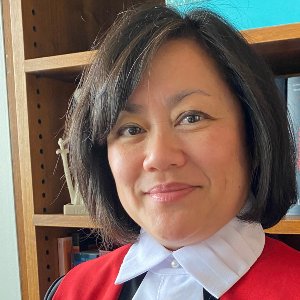The Honourable Aline Quach
 WHAT WAS YOUR PATH INTO LAW AND ONTO THE BENCH?
WHAT WAS YOUR PATH INTO LAW AND ONTO THE BENCH?
I came to Canada as a refugee at age two with my parents and my sister. We had fled Vietnam after the rise of communism. My parents rebuilt their lives here and spared no efforts so that my sister and I could go to university. I had the privilege of attending Collège Sainte-Marcelline, a school run by nuns, where I learned the values of sharing and altruism. These values have stayed with me ever since and guided me throughout my studies there, establishing the path I would follow for the rest of my professional career: to work to help others and give meaning to my life. So, I decided to become a lawyer. In law school, I knew I wanted to help as many litigants as possible and do legal aid work. After the École du Barreau, I was fortunate enough to article at Legal Aid Montreal. As there were no openings available at the end of my articles, I worked in private practice for three years before returning as a permanent lawyer of Legal Aid Montreal, where I stayed until I was appointed to the Superior Court.
WHAT EXPERIENCE IN YOUR LEGAL CAREER BEST PREPARED YOU FOR WORK ON THE BENCH?
As a legal aid lawyer, I helped promote access to justice for my fellow Montrealers. I built close ties with the community, became more attuned to their needs and gained a greater awareness of the multiple social and legal issues they face. Having lived and worked in Montreal since arriving in Canada, I’ve never been a stranger to ethnocultural diversity. Throughout my practice, I’ve always felt that people found it easy to relate to me because of our shared experiences of exile, integration, modest origins, determination and the prospect of success. This common ground gave them an inherent trust in me. The diversity of clients I’ve represented has made me more aware of multiple social and legal issues. In my 17 years of legal aid practice, I’ve appeared before various dispute‑resolution bodies and represented a diverse mix of clients. I was able to build expertise in family law and cross-border child abduction, while honing my craft as a versatile lawyer through cases in civil, administrative and social law. As a litigator, I became intimately familiar with practice courts and the inner workings of the court. I believe that the sum of these experiences has prepared me to become a judge.
WHAT ADVICE TO YOU HAVE FOR COUNSEL WHO APPEAR BEFORE YOU?
I think integrity is crucial if you want to be a lawyer. Always remember that it takes a long time to build a reputation and an instant to destroy it. I appreciate lawyers who show professional courtesy to one another, respect decorum and are adequately prepared. Case preparation is a key skill set that defines a lawyer’s competence. One should never assume that the judge hearing your case has the answers to the legal issues you raise, as law is such a vast field. Lawyers are expected to enlighten the court and present their theory of the case as clearly and simply as possible.
WHAT DO YOU WISH THE PUBLIC KNEW ABOUT THE JUSTICE SYSTEM?
I would like for litigants to know how lucky we are, as Canadians, to live in a democracy and in a country where the justice system is not influenced by the political party in power, where judges have judicial independence, where the Constitution defines the principles that govern the country and where the Charter of Rights and Freedoms protects our basic rights. We should all be grateful for our fortunate position and work together to protect Canada’s democracy and justice system.